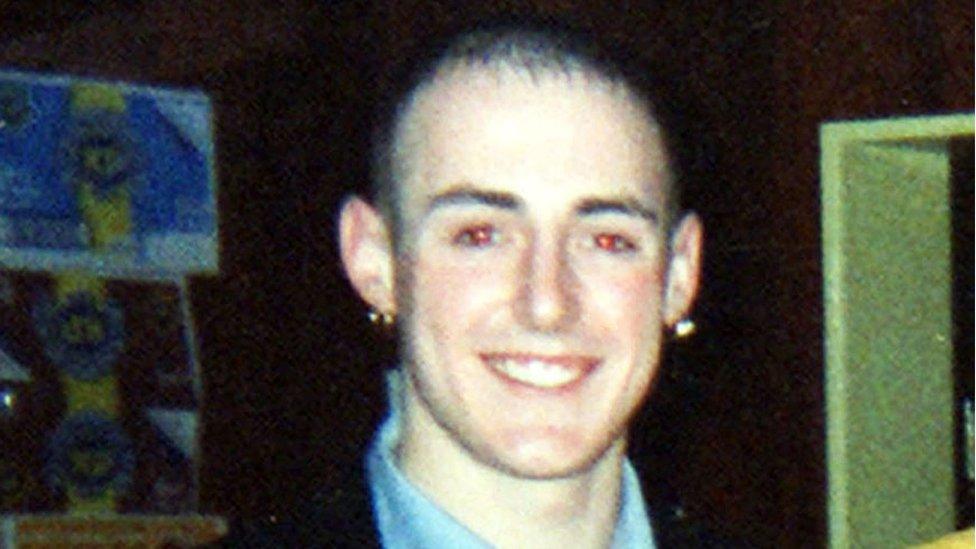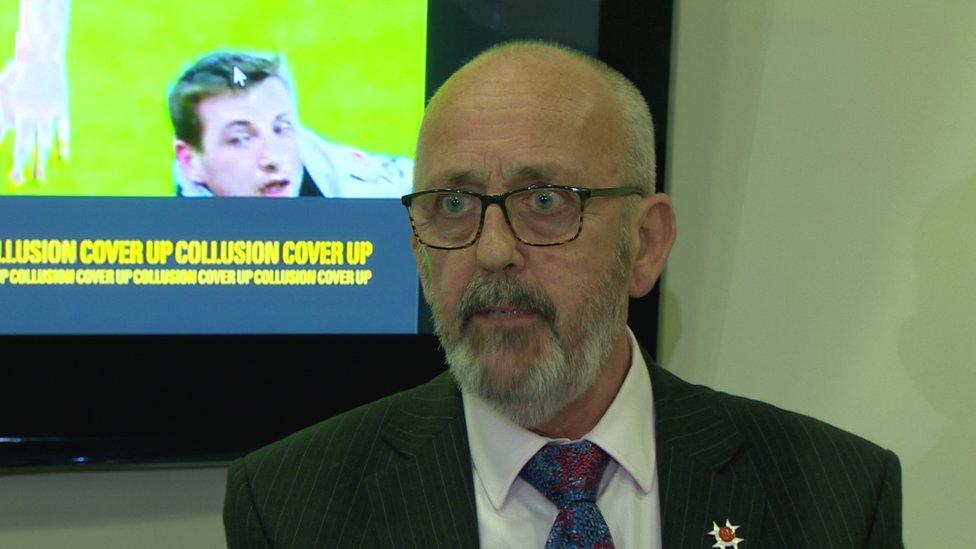Gerard Lawlor: PSNI 'failings' in 2002 murder case
- Published

Gerard Lawlor was 19 when he was shot dead by members of the Ulster Defence Association
The Police Ombudsman has said there were "significant failings" in the investigation into the murder of a Catholic teenager by loyalists in Belfast two decades ago.
But its report found no evidence that the killing of 19-year-old Gerard Lawlor could have been prevented.
It also rejected suggestions of "collusive behaviours" by the police.
The teenager was shot dead as he walked home from a pub in north Belfast on a Sunday night in July 2002.
The Police Service of Northern Ireland (PSNI) said it would "carefully consider" the report.
The Lawlor family said it proved their long-held view that the PSNI murder investigation was flawed.
Mr Lawlor was the last Catholic to be killed by loyalist paramilitaries.
His killers have never been caught.

Gerard's father, John Lawlor, said he still feels police need to be held to account
Speaking at a press conference, John Lawlor, Gerard's father, said he still felt the police service needed to be held to account.
"Nobody can turn out and ask the question why did this not happen and give you a reason for it," he said.
"We did have the belief at that time that everyone was doing as much as they possibly could and it now transcribes that didn't happen."
'We have been let down'
The killing was carried out by the Red Hand Defenders - a cover name for the Ulster Defence Association (UDA).
It was one of the first sectarian murders to be investigated by the newly-formed PSNI which had replaced the Royal Ulster Constabulary (RUC) the previous year.
Mr Lawlor spoke of how the transition from the RUC to the PSNI was viewed by many as a "new era".
"From the Good Friday Agreement, we looked at the golden era, this is what we wanted but we are being let down," he said.
"This should have been wrapped up years ago."
Family solicitor Niall Murphy said: "It is the Lawlor family's firm and regretful conclusion that the PSNI have abjectly failed to conduct a proper investigation, and that the lacklustre and pathetic excuse for an investigation confirms that the PSNI were institutionally indifferent as to whether or not any person would be charged or convicted."
The family disagreed with the Ombudsman's conclusion that there was no "collusive behaviour" by the PSNI.
Mr Murphy said there was still a chance to catch the killers.

The Ombudsman Marie Anderson said: "My investigation found no evidence that police had prior information that Gerard Lawlor was going to be targeted… and I do not believe that an opportunity existed for police to prevent the murder.
"Initial police actions following the murder were conducted in a thorough and competent manner.
"However, my investigation did find evidence of significant failings in aspects of the police investigation and, therefore, I have concluded that a number of the complaints, allegations and concerns made by the family about police actions and omissions are legitimate and justified."
Det Ch Supt Ian Saunders said he recognised the "continued pain" felt by Gerard Lawlor's family.
He said: "Their suffering does not fade and my thoughts are with them today."
'No justification'
One of the failings highlighted by the Ombudsman was the time it took to arrest two suspects in the case, known as Person H and Person I.
They were arrested in August 2003 and subsequently released without charge.
Ms Anderson said there was "no justification" for delaying the arrests of suspects for a year after the murder.
"I am of the view that the impact of delaying arrests for a year provided the suspects with the opportunity to simply state they could not recall what they were doing a year previously," she added.
"I can identify no justification for the delay in the arrest and questioning of suspects and carrying out related searches."
Mr Lawlor had been walking home from the Bellevue Arms on the Antrim Road when he was targeted.
On the same night, there had been other gun attacks and his family said in the past they believed a higher security presence could have prevented his murder.
Related topics
- Published22 November 2012